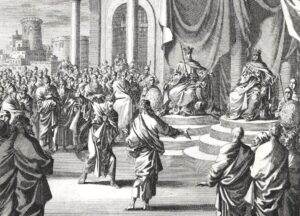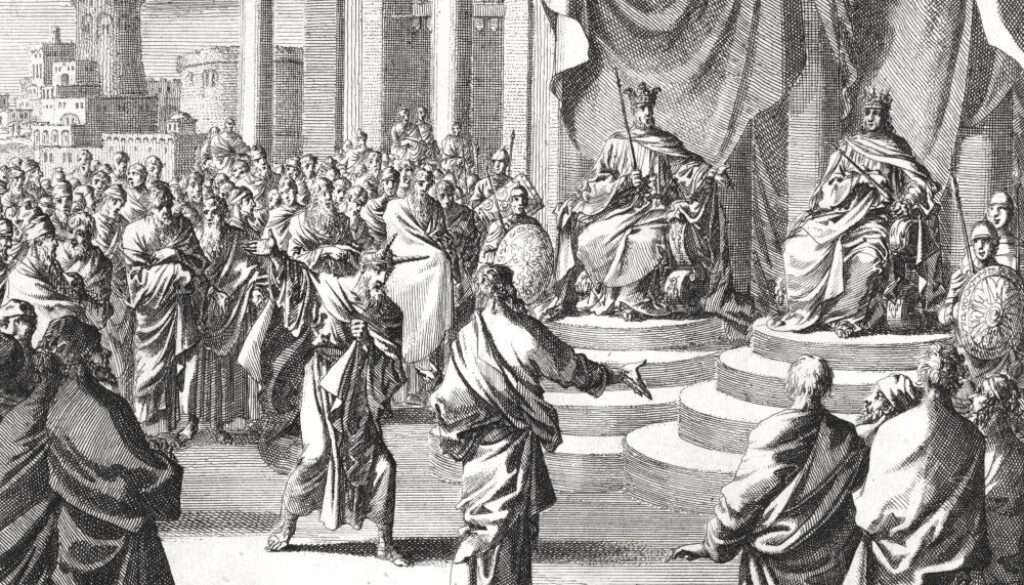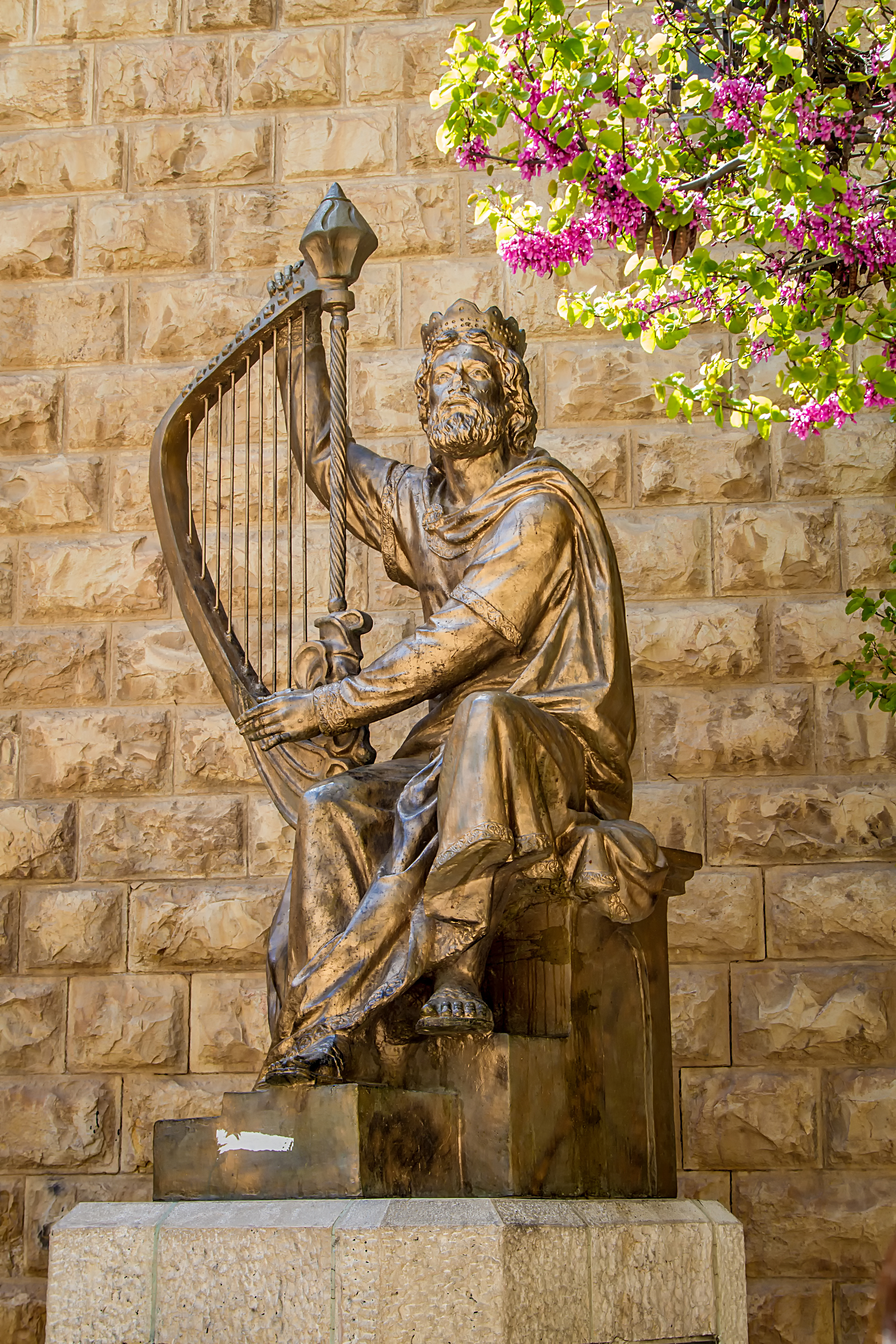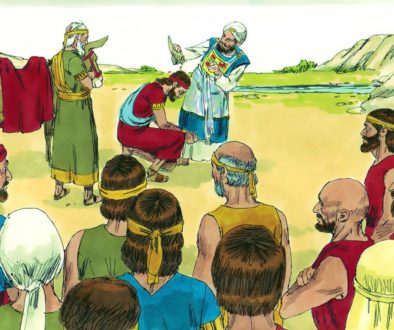1 Kings 22:1-12 False Reports

Ahab has a visit from Jehoshaphat. He wants to test the relationship between the two nations with battle. He listens to false reports as to the predicted outcome.
Ahab made a peace treaty with Ben-hadad when he let him go free. For three years that treaty has held. I would guess it was Ben-hadad was still afraid of Israel’s God. He was defeated twice in battles he should have easily won, by human standards.
I don’t know how relations between Judah and Syria stand at this point. Jehoshaphat had made peace between Israel and Judah and felt secure enough to visit Ahab in his capital city. It appears that they may even have had an alliance at that time. Ahab intends to test it. Let’s step into our story again and watch as Ahab tries to convince Jehoshaphat of the ‘wisdom’ of embarking on this mission.
♥ ♦ ♥
Ahab is standing on the terrace of his palace enjoying a warm spring day. In the distance he sees what appears to be a royal band of travelers. As they get closer Ahab sees that they are flying the banner of Judah. It has been a while since he entertained any of the leaders or elders from Judah. “This might turn out to be a better day than I thought” muses Ahab.
Ahab walks back into the palace and heads for his throne room. He straightens his robes and takes his seat to wait the arrival of the people of Judah. He wonders what news or greetings they might be bringing him.
The guests arrival can be heard in the crunching of gravel under the chariot’s wheels, the stamp of horses hooves, and the shouts of orders fill the air. Ahab checks himself over one more time before the door to the throne room receives a resounding knock.
“Enter” commands Ahab.
The captain of Ahab’s guards steps into the room. “We have a royal visitor from Judah my king. Jehoshaphat, the king of Judah wishes audience with you my king.”
“Show him in and have another chair brought beside me that he may sit comfortably.”
The soldier nods and hurries off to give instructions and to escort Jehoshaphat into Ahab’s presence. “This way my lord” beckons the captain to Jehoshaphat and his guards.
A second, lesser, throne is brought in while the party makes its way to Ahab’s throne room. Ahab has also ordered that a feast be prepared and servants attend them in the throne room.
Jehoshaphat reaches Ahab’s throne room in time to see the chair being set up for him and the retreating backs of several servants as they rush off to continue seeing to Ahab’s commands. Jehoshaphat is pleased with what he sees. He is receiving the welcome of an honored guest.
Jehoshaphat steps into Ahab’s throne room and inclines his head respectfully. “King Ahab, I trust you are doing well?”
“I am king Jehoshaphat. What news of Judah do you bring me this day?”
“No news in particular. I simply wanted to see you and learn of any news of your kingdom’s successes.”
“And we have had MANY. Join me my brother as we may visit easier.”
Jehoshaphat nods his approval and approaches Ahab. He waits patiently for Ahab to indicate the seat beside him before sitting down. It would not do to show disrespect or impatience towards the king of Israel; his host.
Servants move about the throne room preparing drinks and a light meal for the two kings. Small talk flows between the two kings for a whole. Things like, “How are your children” and “what is the latest on…” abound.
As wine, bread and cheese are brought to Ahab and Jehoshaphat Ahab addresses his servants. His question is more for Jehoshaphat’s ears than it is for his servants to answer.
“Do you know that Ramoth-gilead belongs to us, and we keep quiet and do not take it out of the hand of the king of Syria?” (verse 3b).
Jehoshaphat knows that Ahab has some reason for asking this question. He decides to wait him out and see where he goes with this topic.
Ahab turns to Jehoshaphat and asks the question he felt certain was coming.
“Will you go with me to battle at Ramoth-gilead?” (verse 4b).
Jehoshaphat’s countenance registers the utmost sincerity as he renders his answer. “I am as you are, my people as your people, my horses as your horses” (verse 4c).
Ahab’s eyes sparkle with anticipation at Jehoshaphat’s answer, but before he can say another word Jehoshaphat says something that douses the sparkle in Ahab.
“Inquire first for the word of the Lord” (verse 5b).
Ahab would rather inquire of his gods but out of respect for Jehoshaphat, and a desire to have him at his side, he will follow his lead.
Ahab turns back to the throne room and addresses his servants. “Summon the prophets. We will inquire of the Lord at the threshing floor. For there are many prophets and we must ensure that we have heard them all.”
Without another word the servants hurry to their tasks. One team will bring the prophets’ the king’s command. Another will prepare the threshing floor, including positioning thrones for each king to use while listening to the prophets. And a third team will continue to see to the needs of the kings until all is ready and in place.
Barely a quarter of an hour passes before all is ready. Jehoshaphat marvels at the efficiency of Ahab’s servants as they make their way to the threshing floor located just outside the gates of Samaria.
The prophets all appear to be in high spirits as Ahab and Jehoshaphat take their seats. There are about 400 of them gathered to inquire of the Lord for the king. Ahab addresses them with his question. “Shall I go to battle against Ramoth-gilead, or shall I refrain?” (verse 6b).
All at once the prophets go into action. Some of the prophets look to the sky. Some begin to draw in the dirt. Some peer into their robes. Others stand in contemplative quiet. After a few minutes they produce their answer. Some nod their heads while others simply saying “yes.” When the initial noise dies down the spokesperson of the group answers the kings directly. “Go up, for the Lord will give it into the hand of the king” (verse 6c).
Jehoshaphat watched all the prophets as they sought and delivered their answer. His spirit was troubled within him. He did not feel the peace he associated with hearing from the Lord on previous occasions. There was something not quite right about this whole group. He didn’t want to appear disrespectful but he could not take this answer as from the Lord.
“Is there not here another prophet of the Lord of whom we may inquire?” (verse 7).
Ahab looked at Jehoshaphat with shock on his face. “How does he know this isn’t the words of the Lord” wonders Ahab silently. He knows his prophets well enough to recognize that they are seeking to please him above all else but Jehoshaphat shouldn’t have been able to discern this. Resigned to the fact that Jehoshaphat somehow isn’t convinced, Ahab answers Jehoshaphat’s question honestly.
“There is yet one man by whom we may inquire of the Lord, Micaiah the son of Imlah, but I hate him, for he never prophesies good concerning me, but evil” (verse 8b).
Jehoshaphat is surprised by Ahab’s attitude. “Let not the kings say so” (verse 8c) he offers with gentleness.
Ahab breathes a sigh of resignation and then summons an officer to him do his bidding. “Brng quickly Micaiah the son of Imlah” (verse 9b).
The officer rushed off to complete his mission. While the two kings waited for Micaiah’s arrival the prophets continued to try and convince the kings of their answer favorable from the Lord. Zedekiah the son of Chenaanah, the spokesman for the group, had a pair of horns made of iron that he had brought with him. He retrieved these from where they rested upon his cloak on the ground and put them to his head. He came to stand before the kings and began stamping his feet and pawing at the ground as an angry ox would. “Thus says the Lord, ‘With these you shall push the Syrians until they are destroyed’” (verse 11) shouted Zedekiah. Then he began to imitate an oxen pushing his opponent with the horns he held to his head.
The prophets around him took up the prophecy and spoke as one. “Go up to Ramoth-gilead and triumph; the Lord will give it into the hand of the king” (verse 12b).
Jehoshaphat’s skin crawled at this demonstration but he sat silent and awaited the prophet Micaiah’s arrival.
(to be continued)
♥ ♦ ♥
When you put your trust in the Lord you often can feel in your spirit when something is not right. It is the Spirit of God living within you that pushes against the spirit of evil trying to convince you to follow it. We often call it our conscience too. Whatever you name it, LISTEN to it! If something doesn’t feel right, walk away, FAST. I find it interesting that Jehoshaphat doesn’t walk away when he hears the truth. Maybe he recognizes that he has a part to play in God’s judgment of Ahab. But I’m getting ahead of myself for this is a story for another day.
Bottom line, remember to test the spirits and the words behind the spirits that are brought to you. If they don’t line up with God’s word AND His Spirit within you, don’t fall for them. Seek out a ‘second opinion’ if necessary.
Father God, thank You for Your Spirit that shows me Your paths. I know I stray from them more often that I want but You always bring me back. I want to follow You all the time. I want to know that the paths I walk are YOUR paths for me. Open my eyes to see You and my ears to hear Your call. Bring those who have true words from You across my path whenever I’m in doubt. And help me listen ONLY to those voices of truth. I pray I’m NEVER in a place where You allow false information through to bring about judgment on me.




